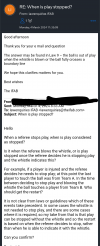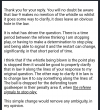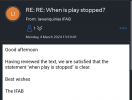one
RefChat Addict
Good try but no cigar this timeThanks for reply. Another example: Blues have ball it deflects off the ref to the Yellows, ref blows up and gives drop ball to Blues. i.e. the whistle comes after the decision to stop - the whistle isn't some absolute time/position of when play is stopped. So..... why are so few 'professional' people mentioning this... including Mark Clattenberg and Mike Dean in his interview.....
The laws define when the ball is out of play in this situation and it (when it has gone out of play) has nothing to do with the time of ref decision or the signal/whistle. The ball is out of play the moment the ball has touched the referee. The ref only decides if all the circumstances are met following the touch and signals to indicate they have.
Similar when the ball just goes over the sideline and comes back in. Ref decides it has gone over the line and usually blows to communicate it. No matter how late the ref decides or blows, the ball is out of play the moment it's over the line.





